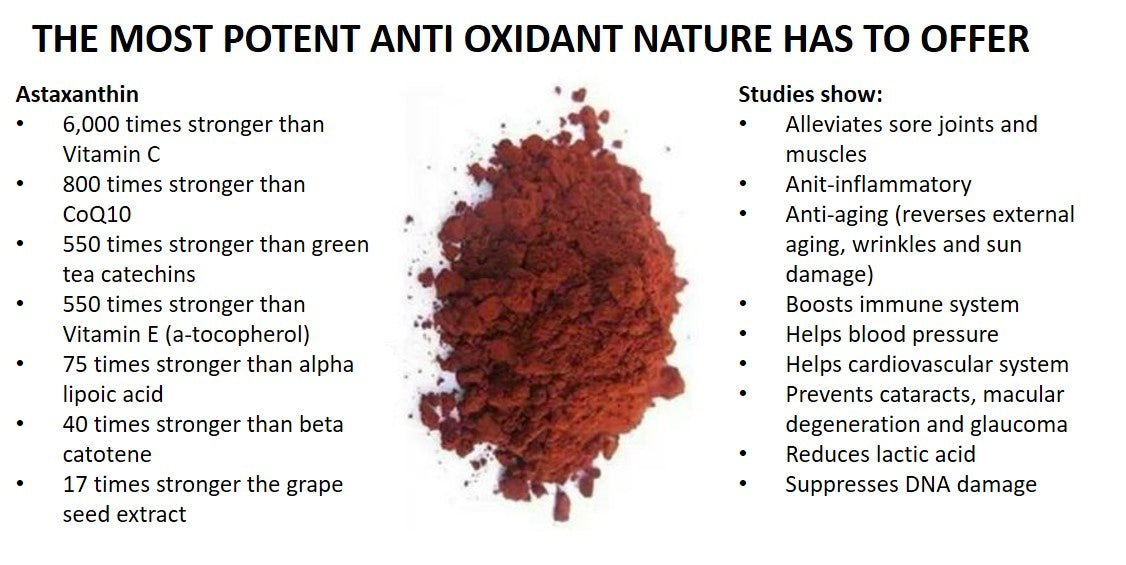If you have not heard of Astaxanthin you are in for an informative read, it is a carotenoid compound like beta carotene (the stuff that makes carrots orange). But unlike beta carotene it has been described as one of the most powerful antioxidants ever discovered. Astaxanthin is a red coloured carotene that is synthesized by Haematococcus microalgae, where it protects the algae from environmental stressors such as UV radiation. It is this algae when consumed by salmon and flamingoes that gives them their orange or pink appearance.
Astaxanthin has a massive list of impressive effects on our health and wellbeing and new research is emerging daily.
Actions of Astaxanthin
Antioxidant – one of the most powerful natural antioxidant found in nature, Astaxanthin has one of the highest ORAC ratings ever found. Its powerful free radical scavenging actions and singlet oxygen quenching actions make it thousands of times more powerful than Vitamin C, and hundreds of times more powerful than Vitamin E, CoQ10 or green tea.
It can actually work on 19 free radicals at a time compared to most antioxidants such as vitamin C which can only work at one at a time. Also unlike other antioxidants it can never become pro-oxidant (actually cause free radical damage). It is uniquely also able to work in both water soluble and fat-soluble environments such as cell membranes and mitochondria (our energy making organelles) and can cross the blood brain barrier and blood retina barrier for antioxidant protection for the nervous system (including the brain) and the eyes.
Anti-inflammatory – Astaxanthin can safely reduce 5 main inflammatory pathways in the body. Inflammation is linked to most chronic disease found in the western world today (heart disease, diabetes, cancer, arthritis, neurological problems etc.) and is due to poor lifestyle choices and or environmental harm (toxins, radiation and pollution). All this without causing side-effects like the pharmaceutical anti-inflammatory drugs.
Anti-Ageing – antioxidant and anti-inflammatory actions alone with help reduce ageing but a compound found in Astaxanthin has been found to exert beneficial effects on the FOXO3 gene known as the longevity gene. Great news for those like us wanting to live well and long!
Beauty from within – one of the main benefits for Astaxanthin is for skin. Its powerful antioxidant action provides essential protection from UV radiation from the sun, providing a natural internal sunscreen and if taken consistently over several weeks it can help reduce sunburn. Remember we need to be in the sun to anchor our circadian rhythm, release happy brain chemicals and boost our vitamin D (all of these are anti-ageing) but avoid sunburn.
Other skin benefits from Astaxanthin include increased hydration, reduced wrinkles, increased tone and elasticity, smoother skin, reduced freckles and under eye puffiness.
These effects are even greater if combined with marine collagen peptides
Health benefits of Astaxanthin
- Increased energy
- Increased sports performance
- Enhanced recovery after exercise
- Glowing youthful skin
- Less aches and pains
- Protection from chronic disease
- Eye protection
- Heart and cholesterol protection
- Brain and neuroprotection
- Liver health
Wow… I hope you are as impressed as we were when we researched the studies
We source our Astaxanthin from New Zealand grown natural algae and blend it with olive oil for improved absorption.
At Younger Secrets this is our super nutrient anti-ageing secret.
References:
Raposo MF, de Morais AM, de Morais RM. Carotenoids from Marine Microalgae: A Valuable Natural Source for the Prevention of Chronic Diseases. Mar Drugs. 2015 Aug 14;13(8):5128-55.
Yoon HS1, Cho HH, Cho S, Lee SR, Shin MH, Chung JH. Supplementating with dietary astaxanthin combined with collagen hydrolysate improves facial elasticity and decreases matrix metalloproteinase-1 and -12 expression: a comparative study with placebo. J Med Food. 2014 Jul;17(7):810-6.

